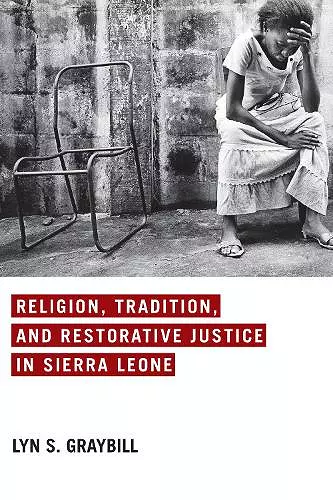Religion, Tradition, and Restorative Justice in Sierra Leone
Examines religion and tradition's role in Sierra Leone's restorative justice efforts.
Format:Hardback
Publisher:University of Notre Dame Press
Published:15th Jun '17
Currently unavailable, and unfortunately no date known when it will be back
This hardback is available in another edition too:
- Hardback£83.00(9780268205065)

This study explores how religion and local traditions in post-conflict Sierra Leone supported restorative justice initiatives, highlighting the contrast between local preferences for reconciliation and the international community's focus on retributive justice.
In Religion, Tradition, and Restorative Justice in Sierra Leone, Lyn Graybill offers an insightful analysis of the role that religion and local customs played in shaping restorative justice efforts following the country’s civil conflict. The study highlights initiatives such as the Truth and Reconciliation Commission (TRC) and the community-based Fambul Tok ceremonies, illustrating how these frameworks were influenced by both Christian and Muslim teachings. Graybill's research is grounded in interviews with leaders from the Inter-Religious Council, revealing diverse perspectives on reconciliation, acknowledgment, and forgiveness.
Through a combination of qualitative interviews and quantitative polling data, Graybill demonstrates that the views of religious leaders align closely with those of the local populace. Both groups favor restorative justice approaches that emphasize reconciliation rather than punishment, reflecting traditional values that prioritize healing over retribution. This alignment underscores the importance of integrating local beliefs into justice processes to foster genuine reconciliation in post-conflict societies.
However, Graybill also points out a significant disconnect between local preferences and the international community's approach to justice, particularly the emphasis on retributive measures exemplified by the Special Court for Sierra Leone. She cautions that the prevailing influence of the International Criminal Court in Africa may further marginalize local customs and values, potentially undermining the effectiveness of peacebuilding efforts. By advocating for a more inclusive approach that respects religious and traditional frameworks, Graybill emphasizes the need for a balanced perspective in post-conflict justice initiatives.
Graybill makes a significant contribution to discussing the controversies and dilemmas associated with pursuing justice in the aftermath of systematic and mass human atrocities... Graybill has added some tools to the toolkit of transitional justice, in a way that easily captures the imagination. -Canadian Journal of African Studies
"Religion, Reconciliation, and Restorative Justice in Sierra-Leone offers a valuable insight into a unique chapter in the larger saga of transitional justice in postcolonial Africa. The wealth of information Graybill has gathered, and her ability to organize this vast quantity of data into a coherent narrative, make this volume indispensible for anyone researching contemporary efforts towards peace and stability in Sierra-Leone." —Journal for Peace and Justice Studies
"Inspired by unanswered questions arising from her noted research on transitional justice in the case of South Africa, Lyn Graybill has crafted a comprehensive examination of the multidimensionality that has characterized the ongoing search for truth, reconciliation, and justice in the wake of Sierra Leone's eleven-year civil war." —Journal of Church and State
"How and when are reconciliation and forgiveness possible? And what is the role of religion here? Lyn Graybill's interesting book makes an original contribution and shows some of the limitations of justice-through-punishment while highlighting the importance of traditional and religiously based modes of reconciliation." —David Keen, London School of Economics and Political Science
"Outside observers of Sierra Leone's brutal civil war often express puzzlement about the evident lack of rancor among the general population towards former 'rebels' and rogue soldiers who committed heinous atrocities during the war. Lyn Graybill's penetrating and well-researched book offers a persuasive explanation for this, justly crediting the use of religious and traditional resources by the Truth and Reconciliation Commission (and by local leaders and conciliators) for helping create the facilitating environment. This is a very important contribution to the debate on transitional justice in Africa and a valuable addition to the literature on Sierra Leone's 'rebel' war." —Lansana Gberie, author of A Dirty War in West Africa: The RUF and the Destruction of Sierra Leone
"Lyn Graybill has produced a detailed, well-researched, and eminently readable account of how Sierra Leone emerged at the start of the century from a decade of turmoil and bloody conflict. In the country's efforts to achieve peace and democracy, reconciliation and justice, a struggle with which I was closely involved, Sierra Leone was subjected unusually to both a War Crimes Court and a Truth and Reconciliation Commission. Graybill highlights how one should take due account of traditional practices in promoting reconciliation and restorative justice, including the role of key indigenous players such as religious leaders, alongside the somewhat heavy-handed efforts of outside influences—lessons from which we should continue to learn as we grapple with ongoing conflicts in the world today." —Peter Penfold, former British High Commissioner to Sierra Leone (1997–2000)
"The book is a gift to scholars and practitioners in the field of transitional justice." —Reading Religion
ISBN: 9780268101893
Dimensions: 229mm x 152mm x 19mm
Weight: 606g
324 pages